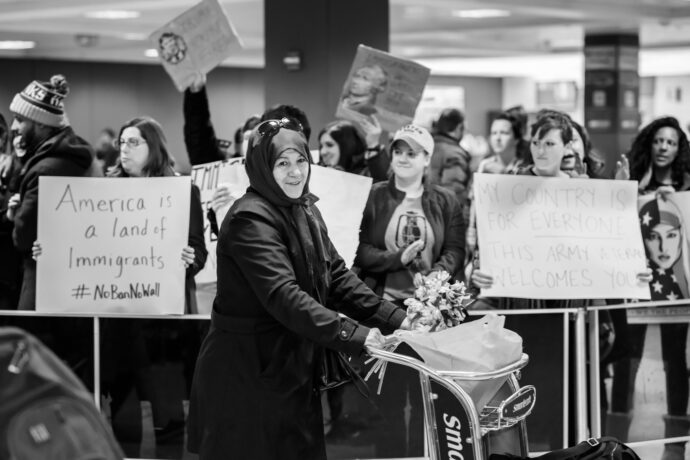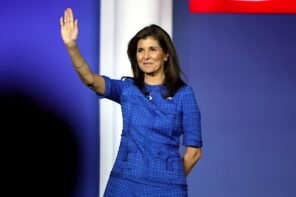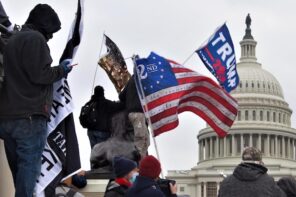Donald Trump’s executive order on immigration, now in its second iteration, deserves its shorthand designation: the Muslim Ban. And this new administration’s slapdash effort to ban travel from Iran, Libya, Somalia, Sudan, Syria and Yemen—currently blocked by federal judges in Hawai’i and Maryland—serves as a striking reminder of how precarious citizenship is.
Green card holders have traditionally been extended the full courtesy of citizenship for entry into the United States. In January, they were robbed of that privilege without any warning. Normally, we would argue that we have to be on guard for this happening to naturalized citizens. Unfortunately, we do not have time to wait when citizens of the United States are barred from entering their own country by their own government.
As historians of South Asian America, we know that having your citizenship stripped because of the color of your skin is not unusual in our history. The United States has a long history of racism being encoded into law, and manifesting in law, on a regular basis. The story of internment of Americans of Japanese descent is perhaps the one that is most recent in our collective memory, partly because of George Takei’s tireless work to keep those stories alive.
However, not even a generation before, we could not decide as a nation who deserved citizenship. Founded on a belief that the only true citizens were free, white, male, and landowning, we divided “the inalienable rights endowed by our creator” amongst haves and have nots. When East Asians started arriving in the United States, we were not sure if they were “white” or not. In 1922 the US Supreme Court ruled in Ozawa v. United States that being white meant being “Caucasian,” not just “not Black,” or “not Native American.”
East Asians were promptly stripped of their citizenship, because they were not white enough for this country.
South Asians believed that they were protected from this sort of decision. As the home of the Aryans, and thus of Caucasians, they would (according to geography) have been granted full citizenship. Yet, in 1923, the Supreme Court ruled against Bhagat Singh Thind, arguing that, despite his claim that being a “high-caste” Indian afforded him the same status as whites, he did not look white. After this, all South Asians were stripped of their land rights.
After each of these instances—Ozawa, Thind, and the Japanese-American internment—there was a massive expropriation of wealth from each of these communities, as being free and white was tied to land-owning, or capital. To remove any category was to remove citizenship and to steal wealth.
Racism has always been profitable, from slavery to Jim Crow—this theft of citizenship and capital simply followed a well-established pattern.
The difference between the 1920s and the 2010s is that in the past, racism was out in the open. This administration hides behind lies and bigger lies to avoid the truth of its racism. But sometimes, someone lets it slip, and Trump’s supporters say things like “Muslim Ban.” From the time when President Barack Obama first ran for office, he was called “Muslim,” because people were afraid to say the n-word in public. The two terms became in many ways synonymous.
The Muslim ban is a ban on people of color, and none of us are secure in our citizenship.
The precariousness of citizenship in the United States is due largely to how white America views change: If it deems change as a threat to power and privilege, it will use any means at its disposal to undermine that change. For example, laws and racial violence in the South after Reconstruction were meant to eliminate the political clout and enfranchisement of newly freed blacks. Similarly, the Asian Exclusion Act was meant to undermine the economic growth of Japanese and Chinese Americans, as well as to scuttle the flow of immigrants from India and the Philippines who had been taking laborer jobs from poor whites.
Indeed, over the past fifty years since the passage of the Civil Rights Act, citizenship for people of color has been under constant attack. Though many of these attempts at disenfranchisement fail, or are overturned by courts, there has been a concerted attempt to use bogeymen (such as minorities committing voter fraud or Muslim terrorists) to justify certain actions. These are often promoted under the premise of upholding American values, when in reality they maliciously target the concept of equal citizenship in a democracy.
What Trump has done is bring out into the open what had previously been done behind the scenes, or with little fanfare. He is now boasting of disenfranchising those from Muslim-majority countries under the call of being a “law and order” president, when in reality, he has violated the law repeatedly.
Moreover, by openly demonizing Muslims and other minorities, he is rhetorically (and literally) attempting to build a wall between white America and its others. Ironically, by doing so, he is cutting America off from itself. Religions like Islam have existed in this country since the 1600s, coming over with enslaved Africans, while Hinduism and Sikhism have been present here since the 1800s. Moreover, lest we forget, the entire Southwest was once part of Mexico.
By idealizing a heteronormative white Christian state, Trump is embracing a view of America that never existed, and is assuring a large swath of the country that it can avoid diversity and demographic change. In doing so, he is also denying the legal and symbolic citizenship of millions.
While legal scholars—and many in Trump’s own party—affirm the steadfastness of equal citizenship in the United States, Trump’s actions underscore just how fragile the very idea of citizenship is. Moreover, if Americans continue to take it for granted, it can quite literally be taken away (completely or in limited scope)—as it was for Blacks and Native Americans in the late 19th century, Asians in the early 20th century, the Japanese in the 1940s—and in some sense, Muslims since 9/11.
This is why combating Trump’s executive order and the assault on equal citizenship requires more than resistance. It involves fundamentally changing the way we educate underrepresented and marginalized communities about the importance of citizenship, and its fragility in times of turbulence and demagoguery.
It also will involve prodding the too often silent majority to take action in defense of citizenship and due process.
Otherwise, the emboldening of Trump will tear the national social fabric, changing forever what it means to be an American.





